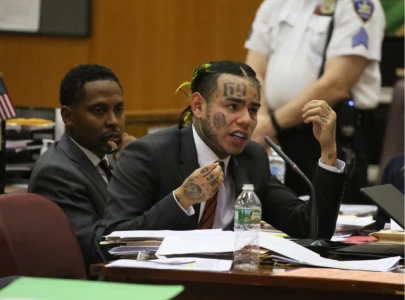Notably, the party does well at providing what former US President George HW Bush called “the vision thing” — an overarching narrative and plan for the country. The PTI has made an effort to match that vision with a policy agenda and roadmap, with the most recent example being Asad Umar’s presentation of the PTI’s economic plan, which offered the bare bones of an economic policy, with the meat promised for later. While watching Umar’s presentation, I was hoping for an immediate opportunity to compare the PTI’s plan with those of its competitors.
Indeed, it might be a good idea for Pakistan to have formal, structured party leaders’ debates before the general elections this winter or spring. Such debates have taken place for decades in the US, which has a presidential system, and Canada, which has a parliamentary system. The benefit of national, televised party leaders’ debates is that it would provide a single opportunity to compare the overall vision and a wide range of policy ideas of Pakistan’s main political parties. It adds substance to the political debate and holds leaders to account in the same room, instead of allowing them to give speeches in isolation that all too often are a string of collected slogans and vague promises.
The format is not unfamiliar to Pakistan. In recent years, Geo News has broadcast a series called “The Great Debate”, which assembled a number of mid-to-senior level political leaders and commentators on stage to debate over a single issue. To ensure fairness and credibility, a private debates commission should be formed that includes representation from the private news channels and PTV. The commission would have complete authority over organising the debate format, rules, and content.
The most contentious issue would be who should participate in the debates. In the United States, this question is generally easy to answer given the two-party system, though the periodic emergence of a third party contender has tested the debates commission’s standards. Ross Perot, head of the upstart Reform Party, was included in the 1992 US presidential debates as he was on top of the polls for parts of the election season. But it was not without a fight. In Canada, upwards of five party leaders have participated in election debates. Some countries require a minimal level of parliamentary representation to be invited. But parliamentary representation as the sole determinant for invitation would exclude Imran Khan — whose party has no members currently serving in the assemblies though it does well today in public opinion surveys — as well as other parties that boycotted the 2008 elections.
Today, Pakistan has a hung parliament, though in the past it has moved in the direction of a two-party system. The emergence of the PML-Q and the PTI and the enduring strength of regional parties such as the ANP, the JUI-F, and the MQM, mean that Pakistan will be a multi-party system for some time. In total, there are dozens of political parties, but only a handful truly shape the national agenda. A debates commission would probably have to use both parliamentary representation and performance in public opinion polls to determine which parties should be invited. Of course, those not invited would cry foul, claiming a conspiracy against them. The commission would also have to be a bit flexible as to who it allows the PPP to represent itself, given that its chairman is ineligible for office and its co-chairman is the nation’s president. The MQM also has a unique situation of its own.
Imagine a single debate or a series of debates in which Nawaz Sharif, Imran Khan and others stand side by side and face questions on their economic, national security, and social development policies from leading journalists and members of the general public. As Pakistan seems to be like a vehicle stuck on neutral on a downhill slope, such a debate might give Pakistani voters a better vantage point at determining who’s best to command the country.
Published in The Express Tribune, August 30th, 2012.
COMMENTS (24)
Comments are moderated and generally will be posted if they are on-topic and not abusive.
For more information, please see our Comments FAQ











@Sheikh Salman:
agreed...and actually people are forgetting that he is an excellent debater and speaker, as are several people from his party. he will have to come back and establish his party before it becomes a national player. but i am confident that will happen soon.
Imran has vast vocabulary of insults and abuses, therefore he will definitely win any debate but, Is there any guarantee that he will contest the election after his TV victory. His past record shows that he backs out at the last moment. First he should contest few elections to gain trust of voters. Once he is established as a real leader, then we will be glad to hear his debate.
great idea and this would be a good way for ppl to see policy debates rather than personality attacks.
I think it is a great idea. Ideally party leaders, but key representative from each parties will work as well.
@Nadir: : the reality at present is democracy will prevail in Pakistan and general election-will be held and Neither CJ nor Army chief will be a party to rule. come out of dreams and try to choose the least corrupt when there is not a better choice, This process only will bring in true, visionary and honest leadership.
Actually... Pervaiz Musharaf was brave enough to face people on National TV.. These politicians don't have guts to face live Audience.
@Ch. Allahdaad: Mian sahab cant even give live interview, and this is on record. NS wont even utter a word in debate!!!
only mian saab have the confidence to come on tv debate and speak. he is only leader with vision. he will beat imran khan in one-to-one talk.
The level of debate, howsoever well designed, will be no better than that seen on TV talk-shows everyday. The audience is not educated enough to benefit from such ideas. Let us concentrate for the time being on saving Pakistan from the failed-state tag. All the rest that we learn from the advanced countries can follow later.
@Ch. Allah Daad: Not only leader has excuses to face KHAN but followers also wish to avoid it. Tsunami can't be competed.
Though the idea of "Great Debate" is not bad, but the question, "Who should be invited & who will represent whom?" is of utmost importance.
If the suggestion is to invite all the party heads/representatives then it would be only time wasting as majority of the parties are "Tanga Party" & for them its hard to win majority seats & take part in making National Policies.
If the suggestion is to invite "the Biggest parties" then as per the current seats/votes PPP, PMLN, PMLQ, ANP, MQM & JUI should be invited. PTI & JI wouldn't be in the list.
If the suggestion is to invite the most popular parties, then we will have to set the criteria of judging the popularity, if it is Online popularity or on ground popularity?
It is also amazing the writer has portrayed PTI & PMLN as the two biggest parties whereas the former still have to prove itself in the polls next year & the later has already became a regional party concentrated in Punjab while the author has declared MQM as a regional party despite that fact it has seats in AJK & GB assemblies too.
As far as Economic Model of Asad Umar is concerned it has great flaws. The creator of the model has already caused great losses for Engro, sorry but we can't trust his model, after all it is the matter of our country & the nation.
It is a wonderful idea, I don't think these dynastic parties will accept the idea, I would even suggest that NA tenure should be limited at present to 4years and later on to 3years. Five years time is a long time and these parliamentarian become rubber stamp assembly because they don't have to answer to the electorate, make them accountable and things will change for the better.
Perhaps author forgot that we have a parliamentary system. Its different than presidential system in which its a contest between top two or three leaders. In Presidential debate, one participant is guranteed to form the government. In our system, first assemblies are elected and then its members elect their leaders. Untill election of house leaders, no one knows who will form the government. Sometime parties change their leaders at the last moment. Therefore, there is a possibility that those leaders who participated in debate, none of them is in the assembly or forms the government. If author is so keen to have discussion, its only possible between top two party leaders and those are Mr. Zardari and Mian Nawaz Sharif. Legally Mr. Zardari cannot participate, because he is also President of Pakistan and could be disqaulified for taking part in debate. Other parties such as MQM, ANP, PML(Q) and JUI(F) are too small and regional parties. PTI has not a single seat in present assemblies, It has boycotted all previous elections and no one knows its strength.. Debate is only possible between equals and those who have some kind of record. In present circumstance, its impossible to have such debate in Pakistan.
@Sameer
No way, head of each party should represent their party.
Nawaz: PMLN Altaf: MQM via telephone LOL Asfandyar: ANP Zardari or Ballu Balram Bhutto Zardari: PPP Maulana Diesel: JUI Achakzai: PKMAP Munawwar Hasan: JI and than obviously King Khan himself for PTI
otherwise Asad Umar will represent PTI.
Most definitely- and why just stop at the top party leaders? We should have it between the candidates of national assembly. The format should be formal with rules clearly defined and approved by the participating candidates. Moderator should control the debate with strict rules and let the nation decide.
The representatives of each party should be those who have held key ruling positions in the past or are expected to be contending for it. For example: PPP: Who cares? MQM: Mustafa Kamal PML (N): Shahbaz Sharif PML (Q): Pervez Illahi PTI: Imran Khan
For all those demanding more local govt, the debates should be among the NA and provincial assembly candidates. Nobody is directly electing the president or PM; they are all electing their local NA or PA members. The voters know them full well and would love to see the difference among them. The local colleges and TV as happens in the west can broadcast these debates. On the other hand debates among one man from one party can be misleading and a popular leader cannot translate his popularity into other seats for his party, especially if they do not have good candidates. On a national scale there could be a series of debates among the reps of all parties on say economics, cultural, foreign policy, defense, etc. In these debates the expert reps of each party can slug it out. Last but not the least I have seen political debates on TV and they were not civilized to say the least. As the democratic process moves forward hopefully this day would come but not now. On the other hand the two biggest political leaders SC CJ and army Chief should be on the TV debating for their divine rights.
Imran will wipe the floor with Nawaz Sharif. Asif Ali Zardari however is a different matter
Great idea. Debates to b conducted in national universities. 5 debates on 5 major issues. To b televised and broadcasted on radio all over Pakistan.
Certainly a great idea. I think IK has already put out the proposal. However, NS or Zardari have yet to accept the challenge.
Haha.. this will be funny. Zaradari and Nawaz won't show up for the Debate due to serious illness while Altaf will have connection problem while calling in the Debate Center :D
Who wants to see a debate between impotent personalities? Add the Army Chief and the CJ and lets tune in.